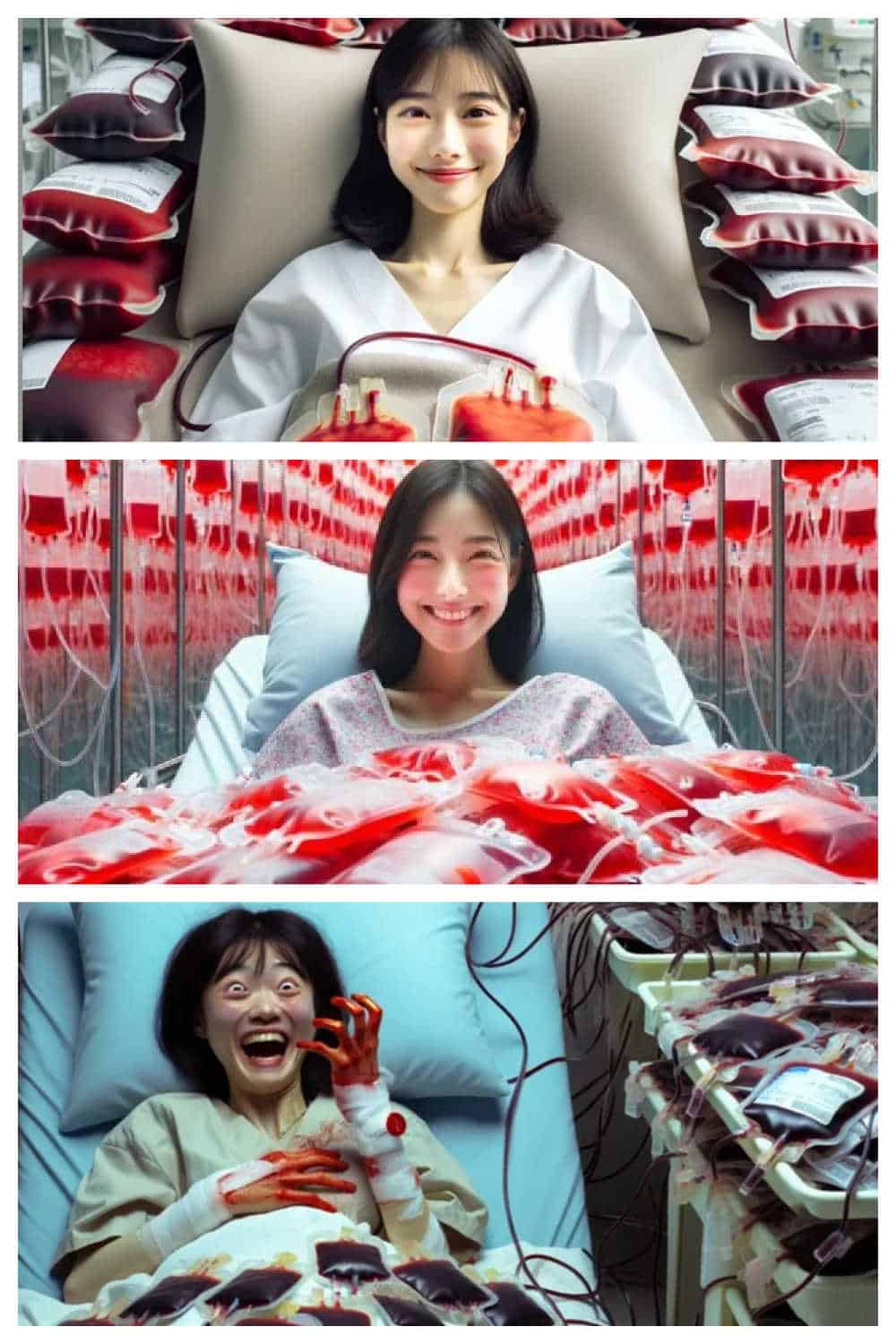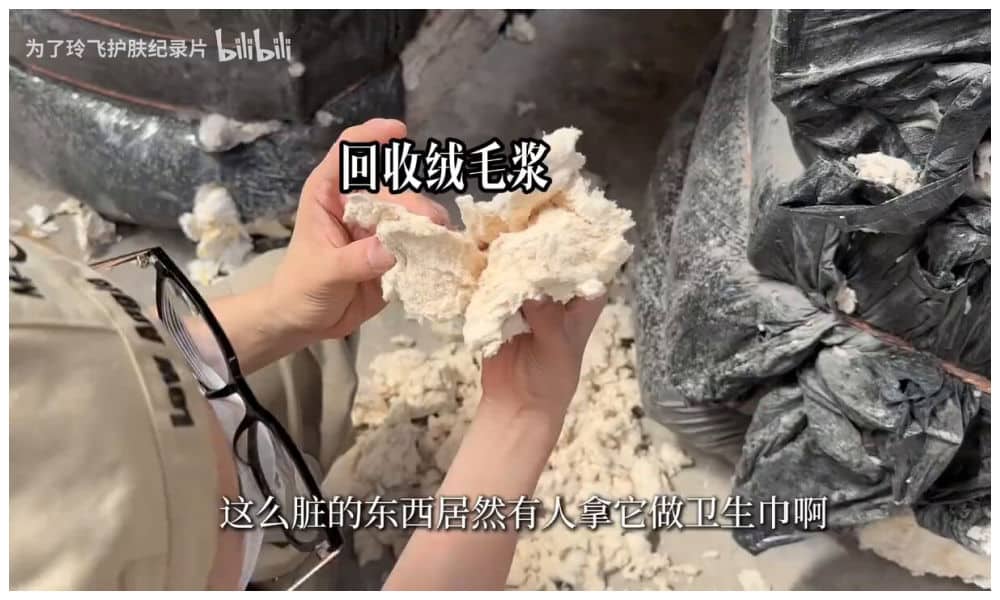China Health & Science
‘Sister Blood Points’ Controversy: Shanghai Woman’s Tibet Blood Donations Ignite Privilege Debate
Dozens of local public officials in Tibet donated blood to rescue a Shanghainese woman. Netizens believe it’s a matter of privilege.
Published
2 years agoon

The medical rescue of a critically injured Shanghai woman in Tibet has recently triggered major controversy on Chinese social media after netizens suspected that the woman’s treatment may have been facilitated through the abuse of power.
What was supposed to be a romantic honeymoon getaway turned into a nightmare for newlyweds Yu Yanyan (27, 余言言) and her husband Tao Li (29, 陶立).
On October 14, just two weeks after their wedding, the couple from Shanghai was driving on China’s National Highway 219. Their destination was Ngari Prefecture in Tibet’s far west, where the average elevation is 4500 meters.
As they drove by the famous mountain pass Jieshan Daban (界山達阪), situated at an altitude of 5347 meters, they suddenly realized that the altitude was affecting them. Soon, Tao Li, who was driving the car, lost consciousness and crashed the car. Yu Yanyan, on the passenger side, was badly injured in the crash.

The crashed car, image via Beijing News/Xinjinbao (source).
What followed was a complicated, time-sensitive, and costly rescue operation. At the Ngari People’s Hospital (阿里地区人民医院), Yu was diagnosed with a ruptured liver, abdominal bleeding, hemorrhagic shock, and thoracic trauma. She was losing a lot of blood in a short time and required surgery, but there was not enough blood available for a blood transfusion at the time in the sparsely populated region, as reported by Beijing News.
Tibetan Civil Servants to the Rescue
While the hospital made efforts to secure donations, specifically requiring an adequate supply of A+ type blood, Yu’s husband was reportedly advised to reach out to the Shanghai Municipal Health Commission (上海卫健委) to inquire about potential assistance. One of his aunts, or his ‘auntie’, allegedly helped him to contact them.
These efforts appeared to be fruitful. Between October 16-17, just days following the crash, numerous members of the public and dozens of local civil servants in Tibet, including firefighters, policemen, and military personnel, stepped forward to donate blood, contributing to over 7000 mL of A-type Rh-positive blood that ultimately saved Yu’s life.
Allegedly thanks to the Tibet office of the Shanghai Municipal People’s Government, a medical specialist from Shanghai was even sent to assist in the medical treatment of Yu at the Ngari hospital.
As Yu later required more advanced medical care and surgeries, she was advised to go to a bigger hospital. She was then transferred via a specially arranged chartered plane. The total costs of this medical chartered plane flight from Ngari to Sichuan’s Huaxi hospital (四川华西医院), arranged by Yu’s father, allegedly cost 1,2 million yuan (US$169.230).

After receiving surgery at the Huaxi Hospital, Yu was in stable condition and was transferred to Shanghai.
An Abuse of Power?
Yu’s story began drawing notice, eventually garnering nationwide media coverage, after Yu herself posted a video on her social media account (Douyin) in which she recounted her experiences. Yu, who only had a relatively small group of followers, told about her rescue operation and her recovery. But instead of garnering sympathy, it led to many questions from netizens and went viral. The video was later deleted.

Screenshots from the since deleted Douyin video.
Who was the ‘auntie’ who reached out to the Shanghai Municipal Health Commission? How were Tibet public officials made to donate blood for this Shanghai patient? What power dynamics were in play that facilitated the mobilization of people in this manner by the family?
People became upset, as they suspected Yu’s life had only been saved because of an abuse of power, and that ordinary Chinese patients would never have never received a similar treatment.
They started referring to Yu as ‘Sister Blood Points.’ The Chinese term is xuè cáo jiě 血槽姐, with xuè cáo 血槽 (lit. blood groove) often being used in the world of gaming to refer to the health bar, an image in video games that shows the player how much energy or blood or strength they have left before it’s game over.

Various online AI-generated images featuring a portrayal of “Sister Blood Points.”
There were also various digital (AI-generated) images showing Yu surrounded by bags of donated blood, portraying her as a privileged, blood-sucking Shanghai ‘princess’ in Tibet.
Following the online commotion, the Ngari Propaganda Department issued a statement on November 29 promising to look into the issue. Additionally, in the first week of December, various Chinese media outlets also started to investigate the case.
An Ordinary Patient in Extraordinary Circumstances
On December 6, online newspaper The Paper (澎湃新闻) published an article together with Shangguan News (上观新闻) which answered some of the most pressing questions surrounding the case.
The Paper reported that they found no officially organized mobilization of public officials or members of the public to donate blood. Instead, local workers and individuals donated blood after learning about the woman’s situation through various channels, including from the hospital staff. Yu Yanyan’s husband Tao called the successful blood donation campaign a result of “multi-party mobilization” (“这是我们多方动员的结果,确实不是有组织的。”)
The Shanghai Municipal Health Commission also denied that they had contacted health authorities in Tibet to ask civil servants to donate blood. They claimed their members of staff did not personally know the patient nor any members of her or her husband’s family.
Furthermore, the article says that the woman known as ‘auntie’ is a 60-year-old retired woman who previously worked at a crafts factory. Upon learning about Yu’s predicament, she forwarded the information to her daughter-in-law, who works at a bank and also did all she could to spread the news and ask for help. This eventually led to the Tibet office of the Shanghai Municipal People’s Government being updated on the situation.
The Tibet office has refuted any suggestion that personal relationships influenced the procedures that resulted in the dispatch of a Shanghai medical expert to assist at Ngari People’s Hospital. A Shanghai medical team stationed in Tibet received a request for urgent support at the hospital and, following their ethical work guidelines, dispatched an expert to provide assistance.
The Paper further stated that nor Yu, nor her husband or their family were officials. In order to pay for the medical flight, Yu’s parents used family savings and borrowed money from others.
All of the information that was coming out about the entire ordeal seemed to indicate that Yu was just an ordinary patient in extraordinary circumstances.
A Sign of Distrust
While certain commenters believe that the latest information has put an end to weeks of speculation, others continue to harbor suspicions that there might be more to the story – they are not satisfied with the answers provided on December 6.
As some netizens dug up screenshots of online calls for help from Tao, Yu’s husband, some commenters responded: “This only makes it clearer that there’s no special status (特殊身份) here. Real influential officials wouldn’t go so low as to seek help online. A simple phone call would have quickly resolved their issue.”
In the end, the entire ordeal, now labeled “The Civil Servant Blood Donation Incident” (公务员献血事件) on Chinese social media, reveals more about public distrust in the transparency of China’s healthcare system than it does about Yu, her family, or the situation in Tibet.
While frustrations regarding privilege and power abuse within China’s healthcare system have existed for years, this issue has gained significant public attention this year in light of the launch of a top-down anti-corruption campaign targeting the healthcare industry.
This issue is especially important due to China’s longstanding struggle with public mistrust in the medical care sector. Some studies even suggest that China’s healthcare system has suffered from a “trust crisis among the public” since the 1990s (Chen & Cheng 2022, 2).
Multiple factors contribute to the relatively low trust in the Chinese healthcare system, but access and costs both play major roles. The sentence “Getting medical attention is difficult, getting medical attention is expensive” (Kànbìng nán, kànbìng guì 看病难,看病贵) has become a well-known expression among Chinese patients dissatisfied with the challenges they encounter in both accessibility and affordability when seeking medical treatments.
Most medical providers in China have become increasingly commercialized and profit-driven since the 1980s, leading to problems with crime and corruption within the medical system as medical professionals are expected to balance both a focus on patient well-being and financial gain. With doctors contending with low pay and incentive-based labor, bribery has emerged as a well-known problem, often considered somewhat of an “open secret” (Fun & Yao 2017, 30-31).
The prevalence of such issues has fueled public frustration, making individual cases like Yu Yanyan’s a source of intense controversy. In an environment where “getting medical attention is difficult, getting medical attention is expensive,” and where corruption is a notorious problem, many people simply do not think it is possible for one young woman to receive so much medical assistance from doctors and civil servants without the involvement of connections, power abuse, and bribery in the process.
Now that more details about the ‘blood point sister’ story have come to light, most netizens have started to question the truth behind this story and realize that Yu might just be an ordinary citizen, while some bloggers are still demanding more answers. In the end, most agree that it is not really about Miss Yu at all, but about whether or not they could expect similar medical treatment if they would end up in such a terrible situation.
“Is there currently an emergency response system in place that allows ordinary people to seek help in equally urgent crises?” (“当前是否存在一个紧急响应机制,可以让普通人在遇到同样紧急的危机时,能寻求帮助?”) one Sina blogger wonders.
“It is actually not important to know if they had special privileges or not,” one Weibo commenter writes: “I just hope that if patients need donated blood in the future, they will get the same treatment.”
By Manya Koetse, with contributions by Miranda Barnes
Get the story behind the hashtag. Subscribe to What’s on Weibo here to receive our newsletter and get access to our latest articles:
References:
Chen, Lu, and Miaoting Cheng. 2022. “Exploring Chinese Elderly’s Trust in the Healthcare System: Empirical Evidence from a Population-Based Survey in China.” International Journal of Environmental Research and Public Health 19 (24): 16461-.
Fun, Yujing & Zelin Yao. 2017. “A State of Contradiction: Medical Corruption and Strain in Beijing Public Hospitals. In: Børge Bakken (Ed.), Crime and the Chinese Dream, Hong Kong University Press: 20–39.
Spotted a mistake or want to add something? Please let us know in comments below or email us. First-time commenters, please be patient – we will have to manually approve your comment before it appears.
©2023 Whatsonweibo. All rights reserved. Do not reproduce our content without permission – you can contact us at info@whatsonweibo.com.
Manya is the founder and editor-in-chief of What's on Weibo, offering independent analysis of social trends, online media, and digital culture in China for over a decade. Subscribe to gain access to content, including the Weibo Watch newsletter, which provides deeper insights into the China trends that matter. More about Manya at manyakoetse.com or follow on X.

China Health & Science
Breaking the Taboo: China’s Sanitary Pad Controversy Sparks Demand for Change
After realizing domestic sanitary pads were literally falling short, Chinese netizens are demanding greater awareness and improvements in long-overlooked issues of quality, affordability, and societal attitudes toward menstruation.
Published
7 months agoon
December 6, 2024By
Ruixin Zhang
Sanitary pads have never been a bigger topic of debate on Chinese social media as it’s been over the past few weeks. What began with one blogger’s discovery of menstrual pads falling short of their advertised size has grown into a broader movement, demanding better-quality products and greater awareness of menstrual health.
Despite being a natural part of life for women around the world, menstruation remains a sensitive and taboo subject in many parts of China, particularly in more conservative, rural areas and smaller cities.
Essential feminine hygiene products like sanitary pads or tampons are often discreetly wrapped in dark plastic bags to avoid drawing attention.
However, this month, the silence was broken. “Sanitary pads” and related topics dominated online discussions, igniting a heated conversation that started with pad length but quickly expanded to include concerns about health, safety, and women’s rights.
EXPOSING THE “SHORTCOMINGS” IN SANITARY PADS
“Buy it if you want, or just don’t.”
In early November, a viral post on Xiaohongshu (later deleted) brought attention to a troubling issue. A woman who purchased sanitary pads online found them significantly shorter than advertised—a supposed 290mm pad measured only 250mm.
When she confronted the seller, they dismissed her concerns, citing a “normal 4% margin of error” and claiming, “If you order 290mm, we can only send 250mm—that’s the rule.”
The post struck a nerve. Netizens began measuring their own pads and discovered that many brands similarly fell short of their advertised lengths. This perceived deception ignited widespread outrage:
“They market themselves as designed for women, but even the lengths are misleading?”
“We pay the highest taxes for subpar products!”
The controversy soon spread to platforms like Douban and Weibo, where more and more people started comparing advertised versus actual pad lengths. The results revealed that many well-known brands consistently fell short, raising accusations of industry-wide cost-cutting.

Facing mounting pressure, several Chinese brands issued responses claiming their products adhered to the national standard that allows a ±4% length deviation. According to this standard, a 290mm pad can legally measure between 278mm and 302mm.
However, consumer measurements consistently showed pads at the lower limit—or even shorter. This raised suspicions that manufacturers were exploiting the -4% allowance as an industry norm to cut costs.
Some netizens compiled a crowdsourced chart comparing the advertised length, actual length, and cotton coverage of various brands. The findings revealed similar discrepancies across major brands.

Various brands’ responses to the controversy listed by blogger @妳健康富有.
Some brands, with size deviations as large as -15%, responded evasively to consumer concerns, claiming that such deviations are normal and do not affect usage. These responses only fueled further frustration among netizens, who accused the brands of dismissing their concerns. As one blogger (@你健康富有) remarked, the brands’ attitude couldn’t be clearer: “‘Buy it if you want, or just don’t.'”
BEYOND LENGTH: A DEEPER ISSUE
“Society tolerates or even reinforces menstrual stigma.”
While the pad length scandal initially focused on cost-cutting, the ensuing discussions uncovered far more serious concerns. A resurfaced video by documentary filmmaker and blogger Fourfire (四火, @为了玲飞护肤纪录片) revealed the industry’s dark side. The video exposed illegal factories recycling used materials, including shredded pads and diapers, into new sanitary products. These contaminated pads, sold cheaply on e-commerce platforms, have been linked to pelvic inflammation and other gynecological problems.
In the video, Fourfire urged women to stick to well-known brands and purchase from reputable retailers.

Still from the video by documentary filmmaker and blogger Fourfire (四火, @为了玲飞护肤纪录片)
But are pricier pads from major retailers truly safe? Quality issues with domestic brands have surfaced repeatedly, and this latest length discussion reignited those concerns. Consumer-created “red-flagged brands” for domestic pads feature numerous well-known brands with prior reports of containing maggots, mold, and other contaminants.
This renewed scrutiny prompted questions and discussions among female netizens. One user asked, “Is there any brand of sanitary pads that’s actually safe to use?” Among the hundreds of replies and shares, one prevailing sentiment emerged: “None of them.” Many users began to view previous quality issues not as isolated incidents but as indicative of broader problems within the industry.
Adding fuel to the fire, one blogger (@迷宝吃不饱) claimed that the national standards for sanitary pads in China allow a pH range of 4–9. This range aligns with standards for non-intimate textiles, such as jackets or curtains. Given that human skin is slightly acidic, with a pH between 4.1 and 5.8 (3.8–4.5 for intimate zones), products in close contact with the skin, such as sanitary pads, should ideally be designed to maintain the skin’s natural pH balance and prevent irritation.
This seemingly loose standard sparked further concerns among female consumers. Many began reflecting on their past experiences, sharing issues they’d faced while using sanitary pads—frequent inflammation, allergic reactions, itching, and other symptoms. Few had considered the possibility that these problems might be linked to the pads themselves.
In response, experts argued that the materials, hygiene, and sterilization of pads were far more critical than pH levels. However, in today’s China, where public trust in such authorities is relatively low (read: “Experts Are Advised Not to Advise“), this explanation not exactly reassured the public. Gynecologists and popular science influencers, such as Sixthfloor (@六层楼先生), pointed out that similar products like baby diapers and men’s sanitary pads are held to stricter production standards. This disparity naturally fueled suspicion and concern about women being disadvantaged and the role of societal taboos surrounding menstruation.
One Douban user commented: “Society tolerates or even reinforces menstrual stigma. The less we talk about sanitary pads, the easier it is for companies to profit from women.”
BREAKING THE SILENCE
“Decisions about menstrual products are being made by people who don’t menstruate.”
Sanitary pads in China are relatively expensive and not covered by health insurance. A single daytime pad from a common brand costs around 1 RMB ($0.15), while nighttime pads can be twice as expensive. Over a typical six-day period, a woman might spend 30-40 RMB ($4.15-$5.50) each month. Tampons, though less popular in China, are even more costly.
For women in impoverished or rural areas, this expense can be a significant burden. Many are forced to purchase low-cost, unregulated “three-no” products (no license, no standards, no brand), often manufactured by the shady companies exposed in Fourfire’s video. On Taobao, product reviews for these pads reveal heartbreaking stories. Some users recommend switching to safer, higher-quality options, but responses often reflect the harsh reality: “I don’t have a choice.”
Now, as major brands face public backlash, many women are turning to “medical-grade sanitary pads,” originally made for surgical recovery or heavy bleeding. According to the Sichuan Observation media channel (@四川观察), online searches for these products have jumped by over 3,000%. While safer, these pads are even more expensive.
The frustration is clear: “Do we really have to keep paying more for basic necessities just to protect our health? Why not just make regular sanitary pads safe and reliable? Is that too much to ask?”
So why is it so hard to produce affordable, safe sanitary pads without cost-cutting tricks? The answer may lie in a regulatory change made over a decade ago. In 2008, new national standards for sanitary pads eliminated quality grading classifications and reduced minimum requirements for the length of filling cotton. This gave manufacturers more freedom to cut costs, often at the expense of quality.
One glaring detail hasn’t gone unnoticed: the revised standards were drafted entirely by men. As one netizen commented, “Decisions about menstrual products are being made by people who don’t menstruate.” For women, the lack of female representation in an industry directly affecting them is both absurd and infuriating, highlighting a deeper issue of gender imbalance in industries and regulatory frameworks that shape women’s lives.
At the time of writing, distrust in domestic sanitary pad brands in China has reached a peak. Whether driven by exaggerated fears or valid concerns, one thing is clear: after years of menstrual stigma and neglect of women’s health issues, many women feel unheard and are now speaking out. This growing frustration has given rise to an online feminist movement, calling for accountability and demanding change from an industry—and a culture—that has long overlooked some of women’s basic rights.
GRASSROOTS EFFORTS FOR CHANGE
“Girls should never feel ashamed of their periods”
With policymakers mostly male, Chinese women have had to take matters into their own hands. Over the years, various incidents related to menstrual products have gone viral and triggered grassroots efforts to improve the status quo.
The last major public outcry about sanitary pads occurred in 2022 when a woman on a high-speed train discovered they weren’t available for purchase. She vented her frustration online, and the issue quickly gained traction. Many commenters, mostly men, argued that pads weren’t “essential items” and didn’t warrant taking up retail space onboard. The railway authority’s official response—categorizing sanitary pads as “personal items” that didn’t need to be sold—only intensified the outrage.
In the same year, a young woman in Covid quarantine in Xi’an went viral after she tearfully begged anti-epidemic staff for sanitary pads. When workers at her quarantine hotel told her there was nothing they could do, she asked, “So what? Does that mean I have to bleed a river of blood?”
For many women, these incidents highlighted how little society understands or respects their basic needs. In response, people organized online campaigns, flooded hotlines with complaints, and raised awareness about why menstrual products are essential. “Girls should never feel ashamed of their periods,” one netizen wrote.
Sometimes, progress is made. The woman in Xi’an’s quarantine later posted an update, saying she eventually received the menstrual pads she needed. And although pads are still not available on all high-speed trains, they are now provided on many routes—a small but meaningful step.
This time, the debate over pad quality has drawn even greater attention, involving public figures, celebrities, and even tech mogul and Xiaomi founder Lei Jun (雷军), with some hoping that a trusted brand like Xiaomi could play a role in making Chinese sanitary pads safer and more innovative. Women have launched cross-platform campaigns like #ShowYourSanitaryPads (#晒出你的卫生巾#), encouraging people to share posts on Weibo, Douban, and Xiaohongshu to call out brands for inaccurate sizing or poor quality.
Activists are also sharing step-by-step guides on filing formal complaints and advocating for stricter national production standards. The movement is gaining momentum, driven by a collective determination to demand safer, more reliable products.
On November 21, China News Weekly reported that a new national standard for sanitary pads is being drafted. CNR News also called for tighter industry oversight, signaling an urgent response to recent public criticism.
Yet, this response only scratches the surface of the deeper issues surrounding menstrual products in China. Challenges such as the high cost of pads, their limited availability in public spaces, and inadequate menstrual education persist. Will meaningful change continue to rely solely on grassroots efforts? Hopefully, this marks the beginning of a broader, systemic shift that not only addresses these immediate concerns but also redefines how society values and prioritizes women’s basic needs.
By Ruixin Zhang
Independently covering digital China for over a decade. Like what we do? Support us and get the story behind the hashtag by subscribing:
edited for clarity by Manya Koetse
Spotted a mistake or want to add something? Please let us know in comments below or email us. First-time commenters, please be patient – we will have to manually approve your comment before it appears.
©2024 Whatsonweibo. All rights reserved. Do not reproduce our content without permission – you can contact us at info@whatsonweibo.com.
China Health & Science
Stolen Bodies, Censored Headlines: Shanxi Aorui’s Human Bone Scandal
A Chinese company illegally acquired thousands of corpses to produce bone graft materials sold to hospitals—a major scandal now being tightly controlled on social media.
Published
11 months agoon
August 9, 2024
On Thursday night, August 8, while most trending topic lists on Weibo were all about the Olympics, a new and remarkable topic suddenly rose to the number one, namely that about the “Illegal Human Bone Case.” Just moments later, however, the topic had already disappeared from the Weibo hot search list.
An article about the topic by Chinese media outlet The Paper (澎湃)1 that had just been published hours earlier on August 8 had already been taken offline. Later, an article published on The Observer (观察)2 was also redirected. Another article published on the website of Caixin and state broadcaster CCTV similarly disappeared, 3 along with many other headlines.4
However, at the time of writing, there are some articles on the issue, such as by Sina News or Phoenix News, that remained accessible.
The story centers on Shanxi Aorui Bio-Materials Co., Ltd. (山西奥瑞生物材料有限公司), also known as Shanxi Osteorad in English, a company founded in 1999 that specializes in the production and supply of bone graft products.
On August 7, a prominent Chinese lawyer named Yi Shenghua (易胜华), who has a large following on Weibo, exposed details of Shanxi Aorui’s involvement in illegal and unethical practices surrounding the purchase of human bones. The company engaged in these practices for over eight years, from January 2015 to June 2023, generating an income of 380 million yuan ($53 million) from these activities.
These details had previously been disclosed by the Taiyuan Public Security Bureau in May of this year. The case has allegedly been transferred to the Taiyuan Procuratorate for review and potential prosecution, but it has yet to be concluded due to its complexity, involving some 75 suspects.
Over the years, Shanxi Aorui illegally acquired thousands of human remains, reportedly forging body donation registration forms and other documents to illegally purchase bodies from hospitals, funeral homes, and crematoriums from various places, from Sichuan Guangxi, Shandong, and other places. These human remains were then used to produce allogeneic bone implant materials, primarily sold to hospitals.
Due to the high demand for bone implant materials and limited supply, it is an incredibly lucrative industry. Some reports claim that those selling the human remains to Shanxi Aorui could charge between 10,000 and 22,000 yuan per corpse ($1400-$3000).
“I’ve been a criminal lawyer for many years, and have handled all kinds of cases, but this is the first time for me to be so shocked and angry,” Yi Shenghua wrote in his post (screenshot available via RFA.org).”What makes me particularly lose hope is that the maximum punishment for these kinds of people under the current law is only three years.”
However, Yi Shenghua’s Weibo post about the issue was later blocked from public view. “I can still see my own post, but apparently, others cannot,” Yi wrote at 17:35 on Thursday.
On August 9, China’s major pharmaceutical company Sinopharm issued a statement in light of the controversy surrounding the human bone case, stating it has never had any kind of relationship with the Shanxi Aorui company.
On Friday, the news topic on Chinese social media was tightly controlled. Various media outlets, from Weibo to Douyin, reported on the issue, but despite the public’s interest in the scandal, not a single comment could be seen under multiple threads.
‘Even Douyin blocked the Shanxi Aorui incident. Is this the government stepping in?’ one commenter wondered.
‘Why are they suppressing this hot search topic? Do they think the public is stupid?’ another person wrote.
One individual implicated in this case is Li Baoxing (李宝兴, born 1955), who was General Manager at Shanxi Aorui. Li is a renowned research professor who was reportedly awarded the title of National Model Worker in 2005. He was formerly affiliated with the Institute of Biomaterials Science and Technology at the Chinese Academy of Sciences, where he developed bone implant materials that benefited thousands of patients across the country. He allegedly joined the Communist Party in 1985.
Some commenters called the entire scandal a “horror film,” with Li Baoxing being the director.
“We know about 4000 [human remains], what about those we don’t know about?”
“These so-called ‘human remains’ were once people like you and me,” another Weibo user wrote: “They were alive, their voices and smile are still in the hearts of family and friends. They liked to be clean, they had their privacy, they are still being missed. We can’t replace ourselves or our loved ones, [yet] they were used and peeled layer by layer.”
By Manya Koetse
1 Title: “探访涉盗卖数千具人体骨骼的山西奥瑞公司,此前已被公安查封” (“Investigation into Shanxi Aorui Bio, involved in the illegal sale of thousands of human bones, which had previously been seized by police”). Original link: https://www.thepaper.cn/newsDetail_forward_28348324
2 Title: “涉嫌非法盗卖数千具遗体用于制作植入材料,山西奥瑞生物八年营收3.8亿” (“Suspected of illegally stealing and selling thousands of human remains for use in making implant materials, Shanxi Aorui Bio made an eight-year revenue of 380 million yuan”). Original link: https://www.guancha.cn/GongSi/2024_08_08_744234.shtml
3 CCTV’s publication is the same as the article published by The Paper, namely: “探访涉盗卖数千具人体骨骼的山西奥瑞公司,此前已被公安查封” (“Investigation into Shanxi Aorui Bio, involved in the illegal sale of thousands of human bones, which had previously been seized by police”). Original link: https://news.cctv.com/2024/08/08/ARTIkxoJEQuHmvTxmxGVmDug240808.shtml. Caixin’s publication was titled “75人卷入山西盗窃倒卖遗体案 多地民政局称已跟进调查” (75 people involved in the theft and sale of human remains in Shanxi, investigations underway by various civil affairs bureaus).
4 For example, by Sina News: “起底倒卖4000具尸体操控者李宝兴- 曾获“全国劳模”称号” (“Li Baoxing, the manipulator who speculated in 4,000 corpses, was awarded the title of “national labor model”). Original link: https://finance.sina.com.cn/chanjing/gsnews/2024-08-08/doc-inchxqva1690315.shtml?cre=sinapc&mod=g.
Spotted a mistake or want to add something? Please let us know in comments below or email us. First-time commenters, please be patient – we will have to manually approve your comment before it appears.
©2024 Whatsonweibo. All rights reserved. Do not reproduce our content without permission – you can contact us at info@whatsonweibo.com.
Subscribe

Jiehun Huazhai (结婚化债): Getting Married to Pay Off Debts

Yearnings, Dreamcore, and the Rise of AI Nostalgia in China

Beauty Influencer Du Meizhu Accused of Scamming Fan Out of $27K

Inside the Labubu Craze and the Globalization of Chinese Designer Toys

Lured with “Free Trip”: 8 Taiwanese Tourists Trafficked to Myanmar Scam Centers

China Is Not Censoring Its Social Media to Please the West

IShowSpeed in China: Streaming China’s Stories Well

Inside the Labubu Craze and the Globalization of Chinese Designer Toys

China Reacts: 3 Trending Hashtags Shaping the Tariff War Narrative

China Trending Week 15/16: Gu Ming Viral Collab, Maozi & Meigui Fallout, Datong Post-Engagement Rape Case

Chinese New Nickname for Trump Mixes Fairy Tales with Tariff War

Strange Encounter During IShowSpeed’s Chengdu Livestream

No Quiet Qingming: From High-Tech Tomb-Sweeping to IShowSpeed & the Seven China Streams

Understanding the Dr. Xiao Medical Scandal

From Trade Crisis to Patriotic Push: Chinese Online Reactions to Trump’s Tariffs
Get in touch
Would you like to become a contributor, or do you have any tips or suggestions? Get in touch here!
Popular Reads
-

 China Media12 months ago
China Media12 months agoA Triumph for “Comrade Trump”: Chinese Social Media Reactions to Trump Rally Shooting
-

 China Memes & Viral12 months ago
China Memes & Viral12 months agoThe “City bu City” (City不City) Meme Takes Chinese Internet by Storm
-

 China Society9 months ago
China Society9 months agoDeath of Chinese Female Motorcycle Influencer ‘Shigao ProMax’ Sparks Debate on Risky Rides for Online Attention
-

 China World11 months ago
China World11 months agoChina at Paris 2024 Olympics Trend File: Medals and Moments on Chinese Social Media




